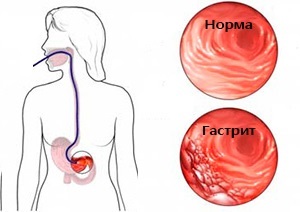 Gastritis is a term used to refer to inflammatory and dystrophic changes in the gastric mucosa (SOJ) that are different in origin and flow. Usually gastritis is manifested by pain syndrome and dyspeptic digestive disorders.
Gastritis is a term used to refer to inflammatory and dystrophic changes in the gastric mucosa (SOJ) that are different in origin and flow. Usually gastritis is manifested by pain syndrome and dyspeptic digestive disorders.
If a person often eats an acute, salted or spicy food, the epithelium of the stomach is thinned, the cells lose their ability to resist gastric juice, and it begins to corrode the walls of the stomach, because of this there is this disease.
Symptoms of stomach gastritis develop gradually in chronic course. The acute form appears 7-12 hours after the ingestion of a provoking factor (poisonous substances, spoiled products, alkalis, acids).
Given that the stomach is a key link in the splitting of food entering the body, it is understandable why the disease is reflected by gastritis not only on the entire gastrointestinal tract, but also on all body systems without exception, significantly reducing the patient's quality of life. Isolate acute (catarrhal, erosive, phlegmonous) and chronic gastritis, the symptoms and treatment of the disease we will consider today.
Causes
The causes of acute gastritis, most often, is the effect on the gastric mucosa of aggressive media or bacteria. It is from the cause will depend how and how to treat gastritis.
The development of the disease can lead to such factors:
- the use of poor-quality food;
- dryness "in a hurry," "on the move";
- non-compliance with diet;
- infection, toxins;
- frequent receptions of some drugs (aspirin, analgin);
- the stress that our lives are full of;
- taking some drugs.
The main causes of chronic gastritis are Helicobacter pylori infection, inappropriate nutrition, alcohol abuse, smoking, frequent stress, neurosis, depression, long-term use of drugs with ulcerogenic properties, industrial hazards (coal, metal dust, lead compounds, etc.).
Treatment of gastritis is much more expensive than its prevention. Therefore, a healthy diet should be your favorite habit, since the onset of the disease can take place without visible symptoms.
Signs of gastritis
To suspect development of a gastritis of a stomach it is possible on certain first signs:
- aching or sharp burning pain in the upper abdomen, which worsens or disappears in the course of food intake;
- nausea;
- vomiting;
- lack of appetite;
- eructation;
- flatulence;
- a feeling of overflow in the upper abdomen after eating;
- weight loss
If you find these signs, it's time to think about how to treat gastritis at home. Otherwise, there may be an exacerbation of symptoms or manifestations of complications.
Symptoms of gastritis
 First of all, with gastritis symptoms directly depend on the form of the disease, as well as the acidity of the stomach.
First of all, with gastritis symptoms directly depend on the form of the disease, as well as the acidity of the stomach.
To determine the symptomsacute gastritisdistinctive: sudden, paroxysmal or unchanging pain that manifests either on an empty stomach, or after some time after eating; symptoms of recurrent or repeated nausea; burning sensation in the chest after a meal - heartburn, may also be a symptom; vomiting with a sour aroma and taste; belching sour; increased salivation; constipation or diarrhea; a decrease in appetite.
Forchronic gastritis with high aciditysymptoms are: hungry pains and nocturnal in the upper abdomen; nausea and vomiting; eructation of acidic contents; constipation; feeling of heaviness in the stomach after eating.
Forchronic gastritis with low aciditysymptoms are:
- disgusting taste in the mouth;
- a decrease in appetite;
- increased salivation;
- nausea in the morning; constipation;
- belching with air;
- rumbling and transfusion in the abdomen.
Chronic gastritis can cause symptoms of periodic exacerbations, which consist in the fact that the main functions of the stomach and the entire gastrointestinal tract are again violated. The tissues of the gastric walls do not heal, as expected.
Exacerbation of chronic gastritis and its symptoms occurs in those who have not treated acute bronchitis, or in any way provoked a new attack. In order for chronic gastritis to recede, a new course of treatment is required.
Diagnostics
Diagnosis of the disease includes the following studies:
- gastroscopy - examination of the gastric mucosa with the help of special equipment;
- laboratory examination of gastric juice;
- biopsy of the stomach mucosa;
- laboratory blood test, feces.
During the diagnosis of the disease specialist must establish the main cause of the pathology. From this in many respects will depend on what to treat gastritis.
Treatment of gastritis
 And now about how to treat gastritis. The acute form of the disease can be treated much more easily than chronic. The patient is prescribed drugs that reduce the acidity of gastric juice.
And now about how to treat gastritis. The acute form of the disease can be treated much more easily than chronic. The patient is prescribed drugs that reduce the acidity of gastric juice.
For this, the following drugs are used:
- almagel, phosphalugel;
- ranitidine,
- famotidine;
- platyphylline,
- atropine;
- astrin,
- pyrene,
- gastropin;
- omeprazole,
- rabeprazole
Of folk methods of treating gastritis, enveloping substances based on decoction of flax seeds, treatment with white clay, and smect have not badly proven themselves. To normalize the digestive function in the treatment of ggastitis appoint femento containing medications:
- pancreatin,
- festal,
- digestal,
- mesym-forte, panzinorm
When diagnosing infectious gastritis caused by the Helicobacter pylori bacterium, antibiotics are indicated for reception:
- omeprazole,
- esomeprazole,
- pyloride,
- clarithromycin,
- tindazole,
- amoxicillin.
A specific drug is selected by a specialist taking into account the patient's general health, the presence of contraindications, etc. Treatment gastritis is a multifaceted process that includes both diet and medication, and strengthening the defenses of the body.
Diet with gastritis
Nutrition depends on the form and course of the disease. With acute gastritis and chronic exacerbation a strict diet is shown, in the phase of remission of a chronic form, the diet can be expanded. At any type of ailment, alcohol, smoking, fried, fatty, spicy food is categorically excluded. To starve, too, can not in any case.
Nutrition of the patient should be fractional, it should be eaten in small portions up to 6 times a day.
How to treat gastritis with folk remedies
Along with traditional methods of treatment, folk remedies are used to help successfully get rid of gastritis. Before starting the use of folk methods, consult a doctor.
- The nausea that occurs with this disease passes quickly if you use St. John's wort. To do this, a tablespoon of dry grass should be poured a glass of boiling water and insist in a thermos for 2 hours. Drink three glasses twice a day.
- Air marsh - 1 part, nettle (grass) - 1 part, chamomile pharmacy (flowers) - 1 part. This recipe is used for gastritis with increased secretion. 1 tbsp. with the top of the collection on a glass of water, boil for 15 minutes in a water bath. To defend, drain. Take 1/3 cup 3 times daily before meals.
- Also, treatment at home is done with the help of a yarrow and a buckthorn. It is necessary to take a teaspoon dried yarrow and buckthorn, pour them with two liters of boiling water, cook for 10 minutes. After that, the broth should be insisted in a thermos for 5 hours. Take half a glass before bedtime for a week.
- Herbal treatment is recognized as one of the most effective. To prepare a remedy, take in equal proportions the herb of St. John's wort, the flowers of marigold and the grass of the yarrow. Grind and evenly mix them, take 2 tablespoons of this mixture and pour boiling water in a volume of 0.5 liters. Then insist for 50 minutes. Take this infusion is necessary for 100 g for half an hour before meals - as many times as you eat every day.
- Gastritis with high acidity is treated with infusion of spray. 15 g of a sheet of a boiling water to fill in 200 g of boiled water and on a water bath to boil 10-15 minutes. Drink 1 tbsp each. 3 times a day. Alternate with infusion of comfrey roots. 4 days drink a decoction of a spray, and then 2 days a decoction of a comfrey. Comfrey cook like this: 2 tbsp. root pour 200 g of boiling water, insist and drink 1 tbsp. 3 times a day.
- You can mix aloe with honey and red wine. Aloe and honey in the amount of 200 grams mixed with 500 g of wine, put in a dark place for 2 weeks. The resulting juice take 1 spoonful 3 times a day.
- Cabbage juice. To make it, squeeze a glass of juice from the cabbage leaves on the juicer. Before use, it should be heated. If the juice in you causes nausea, then drink it more than four hours after it is squeezed. Take the juice should be half a glass 2 times a day for an hour before meals. Cabbage juice can even be prepared in advance. The term of its storage is 36-48 hours (if more - it will not have any effect). Especially this recipe is useful for people with low stomach acidity.
However, treatment of gastritis in the home can only be done after an accurate diagnosis and determination of the acidity of the stomach.

How to choose probiotics for the intestine: a list of drugs.

Effective and inexpensive cough syrups for children and adults.

Modern non-steroidal anti-inflammatory drugs.

Review of tablets from the increased pressure of the new generation.
 Antiviral drugs are inexpensive and effective.
Antiviral drugs are inexpensive and effective.



